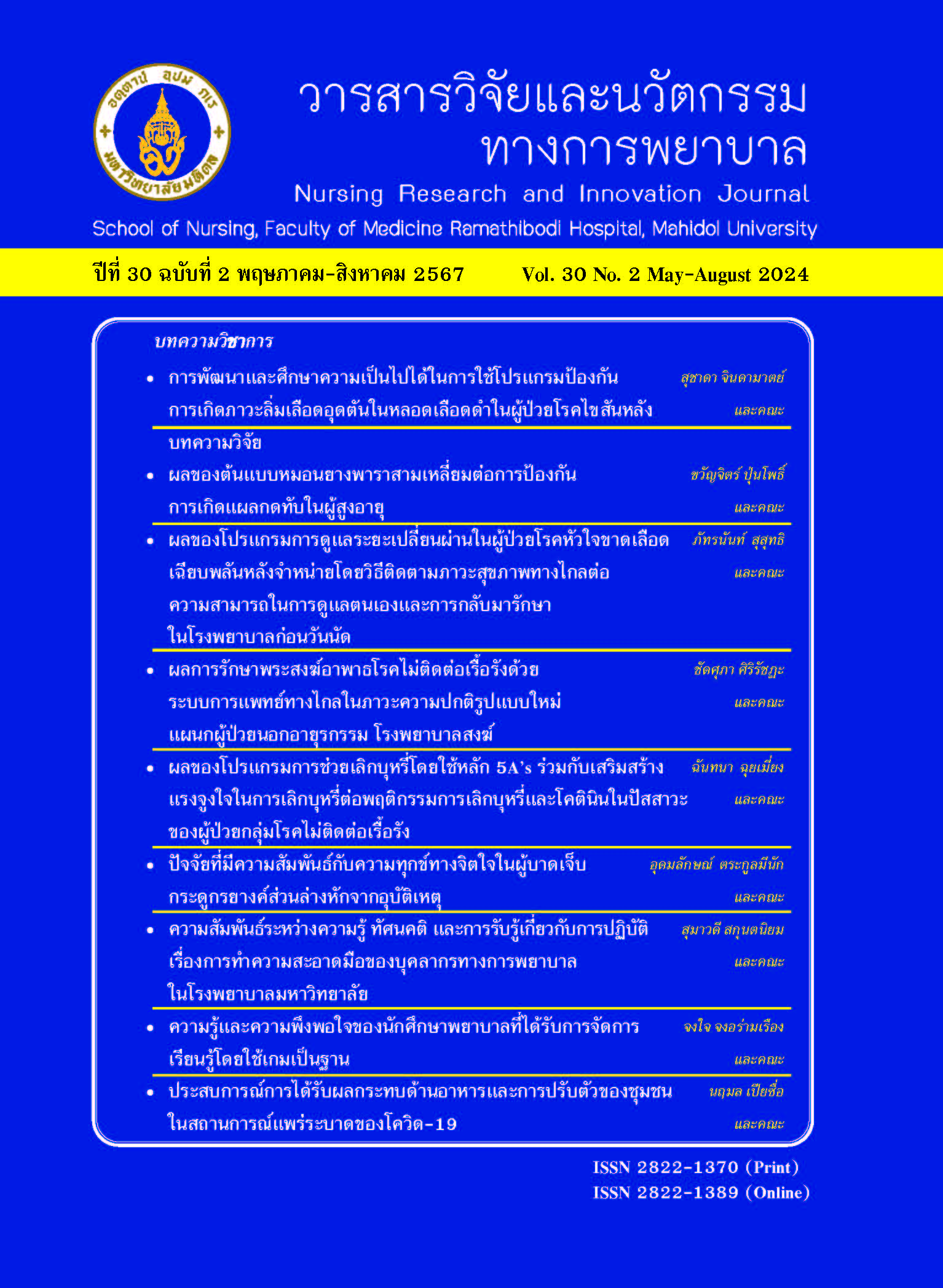ประสบการณ์การได้รับผลกระทบด้านอาหารและการปรับตัวของชุมชนในสถานการณ์แพร่ระบาดของโควิด-19
Main Article Content
บทคัดย่อ
การศึกษาครั้งนี้เป็นการวิจัยเชิงคุณภาพมีวัตถุประสงค์เพื่อศึกษาประสบการณ์การได้รับผลกระทบด้านอาหารและการปรับตัวของชุมชนในสถานการณ์แพร่ระบาดของโควิด-19 กลุ่มผู้ให้ข้อมูล เป็นผู้ที่มีอายุตั้งแต่ 20 ปีขึ้นไปที่อาศัยอยู่ในชุมชนที่ได้รับผลกระทบจากสถานการณ์แพร่ระบาดของโควิด-19 ในกรุงเทพมหานคร คัดเลือกผู้ให้ข้อมูลแบบเฉพาะเจาะจง จำนวน 100 ราย ระหว่างเดือน สิงหาคม 2564 ถึง กุมภาพันธ์ 2565 โดยใช้ แบบสอบถามข้อมูลส่วนบุคคลแบบสอบถามการเข้าถึงอาหารและความมั่นคงทางอาหาร และแบบสัมภาษณ์แบบกึ่งโครงสร้างวิเคราะห์ข้อมูลโดยใช้สถิติบรรยาย และ การวิเคราะห์เนื้อหา ผลการศึกษาพบว่า การแพร่ระบาดของโควิด-19 ส่งผลกระทบต่ออาหาร ได้แก่ 1) การได้มาซึ่งอาหาร/การเข้าถึงอาหาร 2) ปริมาณและคุณภาพอาหาร 3) การรับประทานอาหาร และ 4) ระบบทางเดินอาหาร และการแพร่ระบาดนี้ส่งผลกระทบต่อสุขภาพ ได้แก่ จิตใจและร่างกาย ซึ่งนำไปสู่การปรับตัวของชุมชนดังนี้ 1) สู้เพื่อความอยู่รอด 2) ช่วยเหลือกันไม่ทอดทิ้งกัน 3) หาแนวทางการดูแลเรื่องอาหารในชุมชน และ 4) เดินหน้าผ่านพ้นวิกฤตไปด้วยกัน ผลการศึกษามีข้อเสนอแนะในการสร้างหรือพัฒนาระบบอาหารการวางแผนกำหนดแนวทางในการช่วยเหลือ การดูแลเรื่องอาหารในชุมชนในสถานการณ์วิกฤตอย่างเป็นระบบโดยคำนึงถึงจริยธรรม ประกอบด้วย การมีสิ่งแวดล้อมที่เอื้อต่อการผลิตและแปรรูปอาหาร การกระจายอาหาร และการบริโภคอย่างยั่งยืนเพื่อเสริมสร้างโภชนาการ สุขภาพและสุขภาวะของชุมชน
คำสำคัญ : ชุมชน โควิด-19 อาหาร ผลกระทบ การปรับตัว
Article Details

อนุญาตภายใต้เงื่อนไข Creative Commons Attribution-NonCommercial-NoDerivatives 4.0 International License.
บทความ ข้อมูล เนื้อหา รูปภาพ ฯลฯ ที่ได้รับการตีพิมพ์ในรามาธิบดีพยาบาลสาร ถือเป็นลิขสิทธิ์ของวารสาร หากบุคคลหรือหน่วยงานใดต้องการนำทั้งหมดหรือส่วนหนึ่งส่วนใดไปเผยแพร่หรือเพื่อกระทำการใด ใด จะต้องได้รับอนุญาตเป็นลายลักษณ์อักษรจากรามาธิบดีพยาบาลสารก่อนเท่านั้น
เอกสารอ้างอิง
FAO,IFAD,UNICEF,WFP and WHO. The State of Food Security and Nutrition in the World 2020. Transforming food systems for affordable healthy diets.Rome,FAO.2020.
McKenzie HJ, McKay FH.Food as a discretionary item:The impact of welfare payment changes on low-income single mother’s food choices and strategies. Journal of Poverty and Social Justice. 2017;25(1):35-48.
World Health Organization. Advice for the public:Coronavirus disease (COVID-19). 2020. Available from: https:// www.who.int/ emergencies/diseases/novel-coronavirus-2019/advice-for-public.
Sharifi A, Khavarian-Garmsir AR. The COVID-19 pandemic: Impacts on cities and major lessons for urban planning, design, and management. Sci Total Environ.2020;749:142391.
Beatrice AB,Elizabeth M,Meaghan RB,Lynn R,Rebecca T. The ontario food and nutrition strategy: identifying indicators of food access and food literacy for early monitoring of the food environment. Health Promot Chronic DisPrev Can. 2017;37(9):313.
Alloush M, Bloem JR. The psychological toll of food insecurity.Journal of Economic Behavior & Organization.2022;204:618-30.
Xu W, Xiang L, Proverbs D, Xiong S. The influence of COVID-19 on community disaster resilience. Int J Environ ResPublic Health. 2021;18(1):88.
Alonge O,SonkarlayS, Gwaikolo W,Fahim C, Cooper JL, Peters DH. Understanding the role of community resilience in addressing the Ebola virus disease epidemic in Liberia: a qualitative study (community resilience in Liberia). Glob Health Action. 2019;12 (1): 1662682.
Thitichai Phanthanee,Phantila Thaweewikarn.Coronavirus disease (COVID-19) situation reports and global preventive control measures and Thailand. Retrieved May 2, 2022. Available from: http://www.thaincd.com/document/ file/download/knowledge/ COVID 19.65.pdf
Miles MB, Huberman AM, Huberman MA, Huberman M. (1994). Qualitative data analysis: An expanded sourcebook: sage.
Lincoln YS, Guba EG. (1985). Naturalistic inquiry SAGEPublishing. Retrieved May 1, 2022. Available from:http://uk.Sagepub.com /en-gb/asi/naturalistic-inquiry/book842#preview.
World Health Organization.(2022).Social determinants of health. Retrieved May 1, 2022. Available from:https://www.who.int/ health-topics/social-determinants-of-health#tab=tab_1
Mishra V,Seyedzenouzi G, Almohtadi A, Chowdhury T,Khashkhusha A,Axiaq A,et al.Health inequalities during COVID-19 and their effects on morbidity and mortality.J Healthc Leadersh. 2021;13:19-26.
Chiriboga D, Garay J, BussP, Madrigal RS, Rispel LC.Health inequity during the COVID-19 pandemic: a cry for ethical global leadership. Lancet. 2020 May 30;395(10238):1690-1691.
Béné C, Bakker D, Chavarro MJ, Even B, Melo J,Sonneveld A. Global assessment of the impacts of COVID-19 on food security. Glob FoodSec. 2021;31:100575.
Narasri P, Tantiprasoplap S, Mekwiwatanawong C,Sanongdej W,Piaseu N. Management of food insecurity in the COVID-19 pandemic: a model of sustainable community development. Health Care Women Int.2020;41(11-12):1363-1369.
Zollet S, Colombo L, De Meo P, Marino D, McGreevy SR, McKeon N, et al. Towards territorially embedded,equitable and resilient food systems? insights from grassroots responses to COVID-19 in Italy and the City Regionof Rome.Sustainability. 2021; 13(5):2425.
Fernández-PradosJS,Lozano-DíazA,Muyor-Rodríguez J.Factors explaining social resilience against COVID-19:the case of Spain. European Societies. 2021;23 (sup1):S111-S21.
Bukuluki P, Mwenyango H, Katongole SP, Sidhva D,PalattiyilG. The socio-economic and psychosocial impact of Covid-19 pandemic on urban refugees in Uganda.Social Sciences&Humanities Open.2020;2(1):100045.


